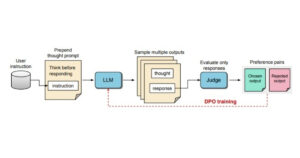Google Strengthens Its AI Operations in the UK with Enhanced Agentspace Data Residency

Google Expands AI Operations in the UK
In a recent announcement on Monday in London, Google executives revealed exciting plans aimed at bolstering the company’s presence in the artificial intelligence (AI) sector within the United Kingdom. CEO of Google DeepMind, Demis Hassabis, joined Google Cloud CEO, Thomas Kurian, alongside key collaborators like BT and WPP, outlining important developments for the future of AI in the country.
New Features for AI Business Sector
One major highlight from the presentation was Google’s initiative to expand its UK data residency service. This move allows businesses to host their AI agents locally on Google’s infrastructure, addressing concerns from organizations that prefer keeping their data within the UK. By ensuring data stays within a controlled environment, companies can mitigate worries regarding data security and privacy.
Additionally, Google aims to attract AI startups by offering financial incentives. Selected participants of Google’s new UK accelerator program could receive up to £280,000 in Google Cloud credits, along with access to enhanced AI skills training. This initiative is intended to foster innovation and empower emerging businesses in the AI landscape.
Insights into Agentspace
Google introduced its new platform, Agentspace, which facilitates the development of AI assistants intended to optimize work processes. This platform stands out for its innovative feature, NotebookLM, which can absorb large datasets and summarize relevant information for enterprise-level use. The array of capabilities within Agentspace includes multimodal search options and the creation of AI agents employing generative AI technologies.
Initially launched as a beta in December 2024, Agentspace has now integrated further into the UK data residency, allowing organizations to access its services while ensuring data privacy.
Addressing Organizational Concerns
Research has shown that many organizations in Europe remain cautious about deploying AI in public cloud settings. Mick Heys, an IDC analyst, highlighted that while organizations are eager to explore AI, they often prefer dedicated, closely managed infrastructures when scaling up. This concern stems from lingering apprehensions about data protection, privacy, and sovereignty. Kurian reassured attendees that businesses would maintain control over their data, fostering a climate of trust.
Partnerships with Key Players
During the event, BT and WPP, both longstanding partners with Google, demonstrated their commitment to AI collaboration. They are already implementing Google’s advanced services, such as Imagen and Gemini, to enhance their operational efficacy. BT CEO Allison Kirby emphasized the significant potential AI holds for improving various operational aspects, including customer service and scam detection.
Regulatory Changes and Governmental Support
The UK government is also advocating for greater AI development both within governmental departments and across the broader industry. Their strategy includes adopting generative AI technologies to streamline operations and improve service delivery. This effort aims to ensure the UK capitalizes on the economic opportunities presented by AI advancements.
As part of these initiatives, the government plans to establish AI regional zones, which would include data center capabilities and regulatory alterations. This effort seeks to encourage the growth of AI services, creating a favorable environment for innovation.
Navigating Intellectual Property in AI
A key point raised by Hassabis was the necessity for establishing international standards in AI usage, particularly around intellectual property (IP) concerns. The UK government’s collaborations with companies like OpenAI and Anthropic—rivals to Google in the generative AI space—signal a competitive landscape that Google aims to navigate effectively. The adjustments in intellectual property rules will play a crucial role in shaping the future of AI development in the UK.
Google’s latest announcements reflect a proactive approach to securing its position in the AI market while addressing concerns regarding data security and fostering innovation within the UK. This multifaceted strategy is aimed at creating a supportive environment for businesses looking to harness the power of AI.






